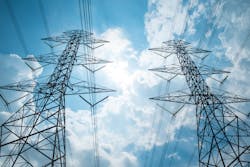Enron's Ghost Haunts Push to Unite U.S. West Under One Grid
(Bloomberg) --California is ready to remake the U.S. West -- or at least its power grid.
The legislature is considering a plan to expand a grid serving 30 million Californians to encompass as many as 13 other Western states -- if they choose to join the effort. The California Independent System Operator, which currently manages a $9.3 billion wholesale market, would cede authority to a regional body under the proposal, which requires federal approval.
It’s an idea that has been discussed in the past but never gone beyond the planning stage. Proponents like California Governor Jerry Brown say a regional grid would cut power costs and boost the use of renewables. But consumer advocates and the Sierra Club warn that the expansion would leave California and its neighbors vulnerable to another energy crisis -- think Enron Corp. -- and lead to more oversight from the pro-coal Trump administration, which on Tuesday released a plan that would relax rules on coal-plant pollution.
“We are worried that California would have to give up its climate leadership in order to form a regional grid,” said Matthew Freedman, a lawyer for the Utility Reform Network. Under a regional system, the state would lose the ability to appoint all of the grid manager’s board members.
As state legislators consider whether to pass the bill by the end of next week, here’s a look at the challenges to making it happen:
Enron’s Ghost
A regional system could give way to the kind of market manipulations that Enron was infamous for in the early 2000s, exposing consumers to soaring energy costs, critics say.
“The ghost of the energy crisis is definitely haunting the whole conversation,” said Rick Umoff, the California director of state affairs for the Solar Energy Industries Association, which supports the regional grid bill. “There’s a fear of losing control.”
Consumer advocates warn that a single market could stick California’s electricity customers with the bill for an entire region if something goes awry.
“We are going to have a lot more of an opportunity for speculation and it is going to come at the expense of California consumers,” Consumer Watchdog’s Liza Tucker said.
The California Independent System Operator says the regional grid could actually save consumers as much as $1.5 billion a year by 2030, according to a report it commissioned that also indicated pollution could be reduced.
Federal Rule?
Another worry is the feds -- whether a multistate system would leave California at the mercy of Trump administration appointees by increasing the Federal Energy Regulatory Commission’s oversight.
“Our concern is that the federal government could say, ‘We are going to put a thumb on the scale and make sure coal wins,’” said Travis Ritchie, an attorney for the Sierra Club, “because that’s what we are seeing in other parts of the country.”
The bill’s sponsor, Assembly member Chris Holden, and the Natural Resources Defense Council say those fears are overblown. FERC already oversees California’s grid.
The U.S. Environmental Protection Agency on Tuesday unveiled a plan that would dramatically weaken pollution limits on coal-fired power plants by shifting most of the regulatory burden to states in a further assault on the Obama climate legacy.
Conflicting Policies
But would greater federal involvement tether environmentally friendly California to policies designed to help coal states that don’t share Western clean-energy ambitions?
Some green-energy advocates like the Sierra Club think so, though Holden says the way it’s written ensures that the state will be able to pursue its own climate goals.
The governor of Utah -- a coal-heavy state -- has worried the opposite would happen, saying his state would be subject to California’s green energy mandates.
Who Joins?
Even if all the kinks get sorted out, the benefits of a regional grid could ultimately be limited if there aren’t enough participants or too many conditions are set.
For example, the Bonneville Power Administration, the giant Northwest hydropower marketer for the federal government that also operates transmission ties between California and Oregon, says it wouldn’t participate.
“A lot of folks are saying, ‘I don’t know if I’d want to join,’” said Dave Cherney, an energy policy expert for PA Consulting Group.
